News & Media
Thoughtful integration of digital tools can lead to safer workplaces – ILO specialist
Unisa recently commemorated World Safety and Health Day 2025 at its Muckleneuk Campus. Observed globally every year on 28 April, the day aims to promote and strengthen the need for a continuous commitment to creating a safe and healthy culture in the workplace, with a focus on reducing work-related injuries, accidents, illnesses, and fatalities for all workers and employees.
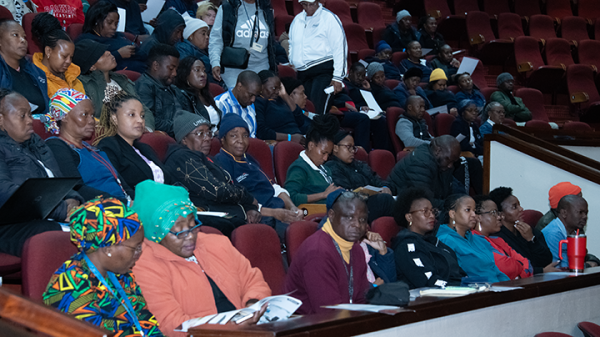
Click here to view a recording of the event
Delivering the welcome address, Unisa Principal and Vice-Chancellor (VC), Professor Puleng LenkaBula, expressed her excitement at the fact that the event was dedicated to engaging on the important imperatives in which the University of South Africa and society must invest for the success of health and wellbeing, wellness, and organisational health.
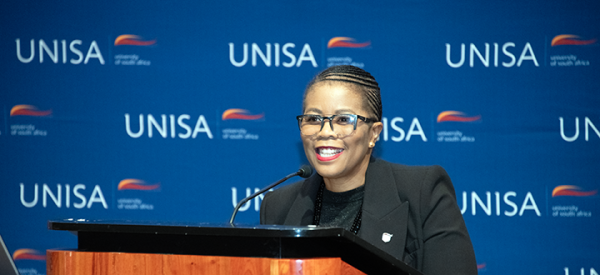
Prof Puleng LenkaBula, Unisa Principal and Vice-Chancellor
She continued: “In a world that is strengthening digital systems and digitalisation, some of the questions that are being asked today are how to employ technology, artificial intelligence, and other modes of work that strengthen how we, as human beings, work. As we stand at the crossroads of technological advancements and workplace transformation, we are compelled to reflect deeply on the evolving nature of work.”
The VC said that digitalisation and artificial intelligence offer unprecedented efficiencies and opportunities, adding that “they also bring forth new challenges that we must meet with foresight, empathy and responsibility. It is important that our safety frameworks develop in tandem with these technological advancements. It is very important in the spirit of the ILO’s call for participation and social dialogue that we, as Unisa, confirm an unwavering commitment to fostering a culture of inclusive, transparent, and proactive health and safety.”
Speaking next, Matsiababa Motebele, Vice-Principal of Operations and Facilities at Unisa, placed the celebratory event in context, saying: “Today is not only about reflection. It is also about the commitment to prevention, a culture of awareness, and proactive leadership in every corner of our university. It is also a time to honour those who have been impacted by unsafe working conditions, and to recognise the efforts being made every day to build safer, more inclusive workspaces.”
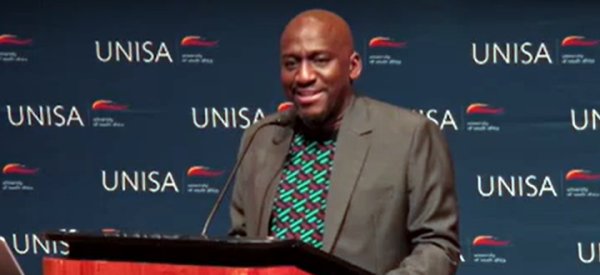
Matsiababa Motebele, Vice-Principal of Operations and Facilities at Unisa
Feresane Sibeko, Executive Director of Facilities Management at Unisa, introduced the keynote speaker, Gamelihle Sibanda, Senior Specialist: Employment-Intensive Investment Programmes, Decent Work Team for Eastern and Southern Africa at the International Labour Organization (ILO).
Kicking off his presentation titled The impacts of digitalisation and artificial intelligence (AI) on workers' safety and health, Sibeko highlighted the illustrious history of the ILO and the many improvements relating to safety, health and conditions of employment that it has negotiated for workers globally over the years.
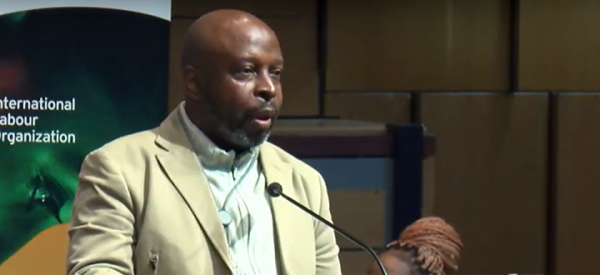
Keynote speaker Gamelihle Sibanda, Senior Specialist: Employment-Intensive Investment Programmes, Decent Work Team for Eastern and Southern Africa at the International Labour Organization (ILO)
Prefacing his engaging and insightful address, Sibeko sketched the global context of digitalisation, AI, and the future of work safety. He then proceeded to examine the following key aspects relating to the theme under discussion:
- The impact of Fourth Industrial Revolution (4IR) tools: These tools are changing tasks and management structures across various sectors.
- Human-robot collaboration hazards.
- Algorithmic management and digital culture: This type of management optimises output, but can increase workloads through relentless pacing and micro-scheduling.
- ILO standards and regulations: The ILO calls for updated regulations addressing human-robot collaboration and telework ergonomics to ensure worker safety.
Turning to the positive impacts of digitalisation and AI on occupational health and safety, Sibeko touched on, among others, the following:
- Automation and remote inspection tools: A range of innovations in this area protect workers from harm during hazardous procedures.
- Wearables and predictive maintenance: Workplace safety is enhanced by, among others, smart helmets, AI vision systems, predictive maintenance and connected fall-arrest systems.
- Virtual reality (VR) and augmented reality (AR) simulations and AI scheduling: Such simulations allow workers to practise high-risk scenarios safely, while AI scheduling optimises staff rotation and breaks.
- Smart buildings and telework tech: Smart buildings reduce distraction and enhance the comfort of workers, and telework tech enables flexibility while maintaining productivity.
Regarding the ILO’s role concerning ethics, Sibeko noted that the organisation collects and shares best practices for ethical AI governance, promotes algorithmic fairness, and emphasises the need for transparency in worker monitoring practices.
In conclusion, Sibeko provided the following insights:
- Digitalisation and AI are transforming occupational health and safety practices, thus enhancing risk management and response techniques.
- While there are challenges in implementing new technologies, there are also significant opportunities for improvement in workplace safety.
- Thoughtful integration of digital tools can lead to safer workplaces and improved health outcomes for workers.
Further insights were provided in addresses by Lehlohonolo Mokhohlouloane, President of the Safety, Health and Environment Campus Association of South Africa (SHECASA), Dr Mary Kgole, lecturer at the University of Pretoria and Managing Director of the Mabebe Wellness and Professional Solutions, Leonie Louw, Research Ethics Officer at Unisa’s Directorate: Research Support, and Harold Gaze, Vice-President of the South African Institute of Occupational Safety and Health (SAIOSH).
Perspectives from organised labour were presented by Mzwamadoda Bhomoyi, Branch Chairperson of the National Education, Health and Allied Workers' Union (NEHAWU), and Boshadi Semenya, Executive Additional Member of the Academic and Professional Staff Association (APSA).
Closing remarks and the vote of thanks were presented by Ramotsoa Modiselle, Deputy Chairperson of Unisa’s Institutional Occupational Health and Safety Committee,
During the course of the programme, the Unisa Choir added to the celebratory spirit of the event with traditional song, and a thought-provoking industrial theatre performance by Mpelampela Productions reinforced the day’s main themes in an entertaining yet impactful manner.
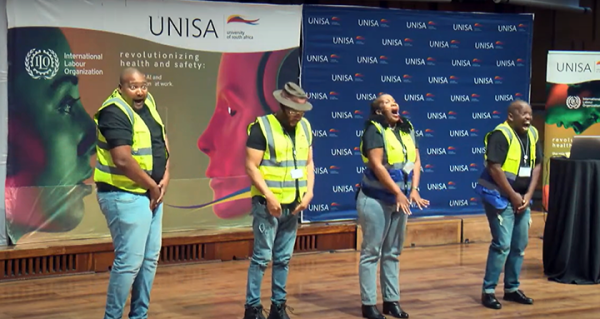
Industrial theatre performance by Mpelampela Productions
Professionally facilitating the highly successful event were programme directors Dr Trudy Forbay, Acting Director, Print Production, and Joe Bopape, Deputy Director, Governance, Reporting and Support, both from Unisa. Wide inclusivity was afforded by sign language interpreters Mpho Masina and Nomsa Mathebula.
The day’s proceedings ended on a high note, with attendees invited to an aerobic exercise session led by Vusi ‘Blck Vreka’ Hlabangwana.
* By Philip van der Merwe, Editor, Department of Institutional Advancement
* Photography by the Unisa Multimedia Centre
Publish date: 2025-04-29 00:00:00.0


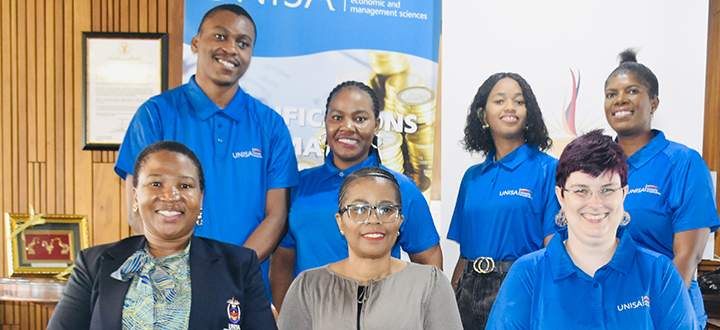 Unisa VC expresses pride in students heading to global challenge finals
Unisa VC expresses pride in students heading to global challenge finals
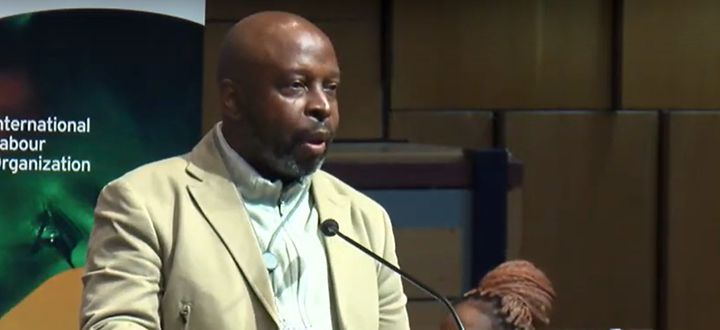 Thoughtful integration of digital tools can lead to safer workplaces – ILO specialist
Thoughtful integration of digital tools can lead to safer workplaces – ILO specialist
 Unisa and UBU Metaverse pioneer immersive learning experiences with groundbreaking digital twin events
Unisa and UBU Metaverse pioneer immersive learning experiences with groundbreaking digital twin events
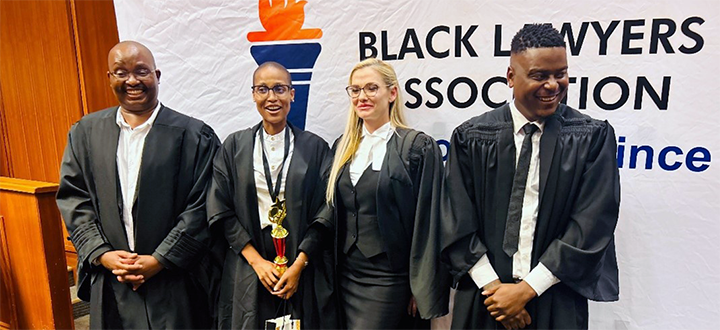 First-year LLB student crowned best mooter
First-year LLB student crowned best mooter
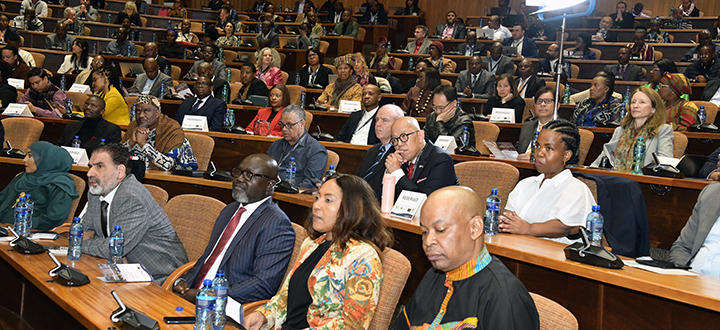 Unisa hosts launch of powerful multisectoral forum at the G20 Africa Investment Summit
Unisa hosts launch of powerful multisectoral forum at the G20 Africa Investment Summit